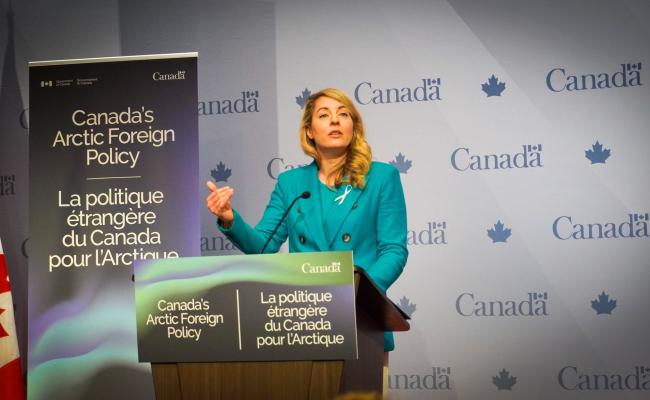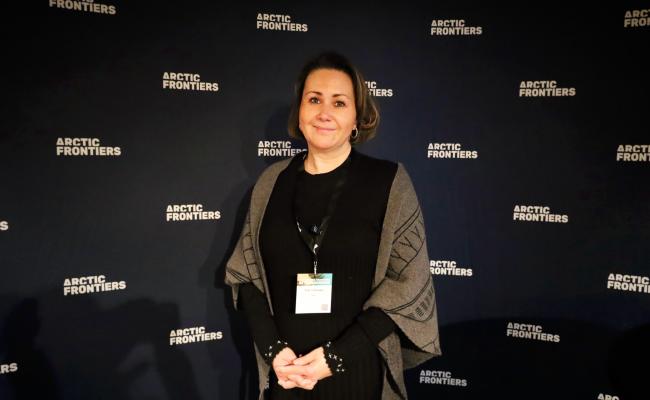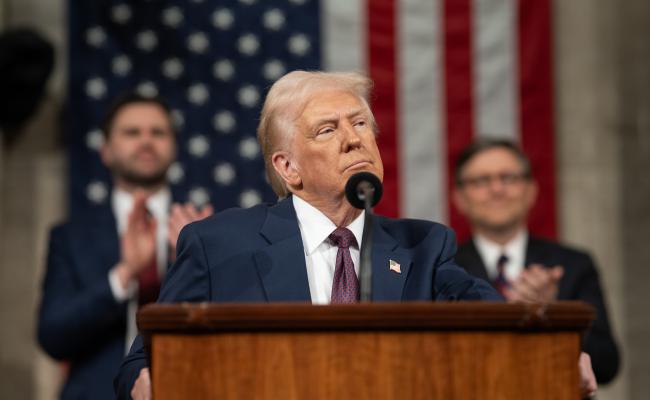Need for a Canadian-European Security Consensus, Says Researcher

As the US becomes an increasingly unpredictable neighbor, Canada must prepare for the impacts on its Arctic foreign policy by engaging more seriously with European Arctic states, says Research Fellow Gabriella Gricius at the North American and Arctic Defence and Security Network (NAADSN). (Photo: Private)
Trump's comments about acquiring Canada and Greenland reinforce the importance of developing Canadian-European collaboration regarding the Arctic, says research fellow Gabriella Gricius at the North American and Arctic Defense and Security Network.
US President Donald Trump's statements on Greenland and Canada have sent shockwaves through Europe and North America.
Trump has repeatedly stated that he wants Canada to become the 51st state of the US. Most recently, he referred to Canadian Prime Minister Justin Trudeau as the "Governor," once again suggesting that Canada would be better off under the US's ambit.
The US president stated in January that he would consider using "economic force" to acquire Canada.
The US then imposed 25% tariffs on imports from Canada and Mexico, which entered into force on Tuesday. This led to a retaliatory tariff from Canada, with 25 percent tariffs on $155 billion of imported goods. On Thursday, however, Trump announced that the tariff would be postponed for one month for Canadian and Mexican goods that fall under the USMCA Agreement.
Trump's attitude toward Canada is not new. Similar statements were made during his first presidential term but were not taken seriously. However, the Trump administration has embarked on its second term with far more power of execution and resourcefulness.
As the US becomes an increasingly unpredictable neighbor, Canada must prepare for the impacts on its Arctic foreign policy by engaging more seriously with European Arctic states, says Research Fellow Gabriella Gricius at the North American and Arctic Defence and Security Network (NAADSN).
"The push and pull on Trump’s tariffs threats to me means that the U.S. is not a reliable partner in many ways for Canada. That being said, Canada and the U.S.’s long-standing relationship via NORAD for North American continental defense is not going anywhere anytime soon," says Gricius to HNN and continues:
"Even with heightened tension between the U.S. and Canada, it’s hard to imagine that this will impact operational military cooperation. That being said, Canada could see degrading relations with the U.S. as an opportunity to build additional policies with Europe. For example, it could seek future Arctic economic, environmental, and even security opportunities with Europe as its first option rather than the U.S. I would imagine that working with European Arctic countries on Arctic projects would be more palatable for Canada."
A Canadian-European Arctic Security Consensus
Gricius argues that it is important to have a Canadian-European security consensus in place in order to protect the Arctic. The Trump administration's attack on climate change research and initiatives is especially worrying since the Arctic is impacted by climate change to a higher degree than the rest of the world.
"With an ally that threatens economic coercion, how can such countries rely on an ally like the U.S. to address shared concerns in the Arctic, including the threats posed by Russia, China, and climate change?" she writes in a NAADSN publication.
She adds that Canada and Europe share beliefs, such as climate change being the primary threat to the Arctic. Thus, the Trump administration's actions make a case for a more substantial Canadian and European-led Arctic security consensus.
Working with European Arctic countries on Arctic projects would be more palatable for Canada.
She also states that Canada and Europe share a similar multilateral and cooperative approach to the region. This approach aims for a more predictable and stable security situation and counters Russian aggression through NATO and other intergovernmental arenas.
Three pillars
Gricius says that a Canadian-European Arctic security consensus could include three pillars:
1 Multilateralism at its core
Gricius says the Arctic Council would be the primary forum for soft security, such as environmental and human security. NATO, of which all European Arctic states and Canada are members, could deal with hard matters. These approaches are already the norm, but the researcher argues that reinforcing this norm is particularly important considering Trump's recent threats to leave NATO.
2 Climate change as the most critical threat to Arctic security
Climate change should be considered the most critical threat to Arctic security. The two sides should share lessons learned on best adaptation measures for community, ecosystem, and infrastructure resilience. Indigenous stakeholders should be included by default in such work.
3 Emphasis on military cooperation alongside an avoidance of escalation
This includes joint training exercises amongst NATO members and in other bilateral and multilateral arrangements, responding not only to traditional security threats but also to security risks such as natural disasters, humanitarian security risks, and environmental crises. Military cooperation regarding hybrid threats should also be strengthened between Europe and Canada, as there has been a drastic increase in such threats toward both sides.
Gricius states that although these three areas of Canadian-European collaboration have already commenced or are key aspects of the relationship between Canada and European Arctic allies, Trump's statements and actions reinforce the importance of developing them further:
"If Canada and European allies cannot rely on the U.S. to behave as it has in the past, then steps should be taken now to ensure that a Canadian and European-led conceptualization of Arctic security remains the norm in the region," writes Gricius in her NAADSN publication."
Allies on both sides of the Atlantic are committed to countering Russian aggression in the Arctic.
Arctic policies
The US' most recent Arctic policy refers to climate change as one of the most significant threats to the Arctic region. Yet, the new administration does not appear to share this prioritization.
The new Trump administration has launched a massive attack on climate research, initiatives, funding, and institutions. The US has withdrawn from the Paris Agreement and is trying to undo the Inflation Reduction Act. It has removed all mention of the word 'climate change' on federal websites, grants, and funds and conducted mass firings in essential climate organizations, such as the NOAA.
"Regarding the Trump administration's attack on climate research, I see this as having hugely damaging implications on not only a U.S.-Canada level of scientific research but also on a transnational level," says Gricius.
"The lack of US funding on future projects across the region will mean both individual scientists and larger research organizations in the US will not be able to participate in multilateral research teams on climate and other environmental projects. Additionally, funding for international science from the US is also under threat, which is a danger to the stability of Arctic science research."





